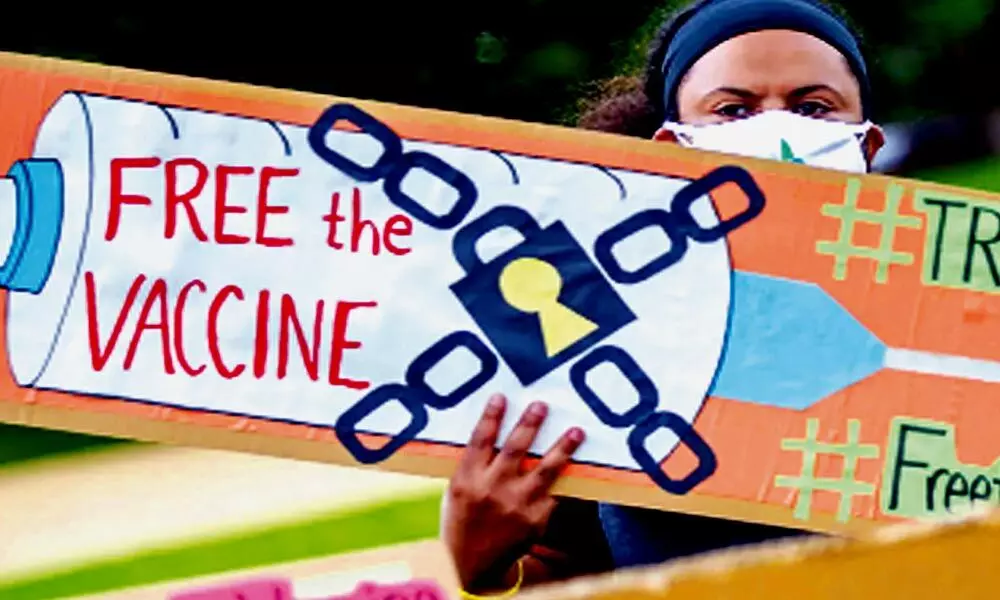For Indian pharma industry, all eyes now on WTO
At WTO 164 member-countries are huddling together to find a solution to the nagging issue of waiver of IP rights and patents for all the Covid-19 medical products
image for illustrative purpose

For the Indian pharmaceutical companies, all roads now lead to the Geneva-headquartered World Trade Organization (WTO) where the 164 member-countries are huddling together to find a solution to the nagging issue of waiver of intellectual property (IP) rights and patents for all the Covid-19 medical products including diagnostic kits, PPEs, ventilators, and vaccines. The WTO's decision is of great significance as in our fierce fight against the corona pandemic, there is a growing mismatch between demand and supply of Covid-19 medical products in the world. And acute shortage of these products has put thousands of lives including the doctors, healthcare workers and other essential workers at serious risk and has further exacerbated the kind of healthcare crisis the modern world has never witnessed before.
In fact, ever since the pandemic started wreaking havoc in the world, both India and South Africa have been knocking at the doors of WTO for waiver of IP rights and patents for Covid-19 medical products. By this IP waiver, under certain provisions of the Trade Related Aspects of Intellectual Property Rights (TRIPS) Agreement, both the countries wanted to ensure rapid access to affordable medical products like diagnostic kits, PPEs, ventilators, vaccines and other medicines to prevent, contain and treat coronavirus disease. In the joint communication, both the countries wanted the waiver to continue until widespread vaccination is in place globally, and the majority of the world's population has developed immunity. Both the countries' clarion call for the waiver is relevant as the outbreak has led to a swift increase in global demand for these medical products with many countries facing acute shortages. Shortages of these Covid-19 medical products have put the lives of health and other essential workers at risk and led to many avoidable deaths. It is also threatening to prolong the pandemic. The longer the current global crisis persists, the greater will be the socio-economic fallout, making it imperative and urgent to collaborate internationally to rapidly contain the outbreak. There are several reports about IP rights potentially hindering timely provisioning of affordable medical products to the patients world over.
Meanwhile, there are reports that the United States, European Union, India and South Africa have reached a consensus on key elements of this long-sought IT waiver for Covid-19 medical products. According to a proposed WTO text, some elements of the consensus deal, including whether the length of any patent waivers would be three years or five years, still need to be finalized. As per the text, it would apply only to patents for Covid-19 vaccines, which would be much more limited in scope than a broad proposed WTO waiver for which India and South Africa have been advocating. The document authorizes use of "patented subject matter required for the production and supply of Covid-19 vaccines without the consent of the right holder to the extent necessary to address the Covid-19 pandemic". Besides, the IP rights would also be waived for ingredients and processes necessary for Covid-19 vaccine manufacture, a move aimed at granting critical know-how to many countries lacking expertise, especially for advanced mRNA-type vaccines.
However, there are several flaws in the proposed provisions as the proposed text contained several limitations, including that the waiver is only available to WTO member countries that exported less than 10 per cent of global exports of Covid-19 vaccine doses in 2021. This means many countries with significant manufacturing capacity for Covid-19 vaccines will not be able to avail of the waiver. Limiting the scope of the vaccine waiver even in the third year of the pandemic is surely ill-conceived. Moreover, the tentative agreement does not include Covid-19 treatments or tests, and the limitations would likely exclude China from any waiver. The proposed agreement largely reiterates existing flexibilities and narrows the scope of the agreement from a full IP waiver on all medical technologies for the course of the pandemic, to only access to vaccines. There are too many limitations to make any significant difference and it is a far cry from the original proposal from India and South Africa that would have effectively addressed the barriers.
A large number of countries, especially the developing and other low-income countries, across the world have been looking to India's leadership in the WTO to protect their aspirations to a full waiver on all IP on medical technologies for the duration of the pandemic. So, it is time Indian government rises to the occasion to provide vaccines for the entire world. India should review the proposed WTO text to ensure that the framework of the agreement should include therapeutics and diagnostics; to ensure all forms of IP are waived; and there should be no geographic barriers to the IP waiver.
(The author is freelance journalist with varied experience in different fields)

